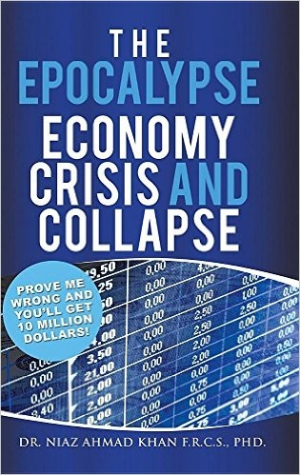The Epocalypse
Economy Crisis and Collapse
With so many nations facing financial peril, Khan’s ideas offer food for thought and are well worth consideration.
What if someone invented a system that would make the world richer and slash the cost of living while eliminating taxes, terrorism, and the black market? You might say pie in the sky, but you would also want to know more. And so it is with Niaz Ahmad Khan’s The Epocalypse: Economy Crisis and Collapse—you want to know more.
The book opens with an illustrated proposal to implement the Mutual Benefit Bond System (MBBS). The bonds would coexist with conventional money and could be used like cash to pay for commodities and services.
Anything could be paid for with these bonds, Khan says, which would be discounted; the company providing the good or service would be relieved of all taxes involved in the cost of production. If paying in dollars, the consumer would pay a higher cost that included taxes.
Khan insists that removing taxes and discounting the bonds would make them so desirable they would instantly trigger a flood of money from purchasers worldwide, enriching poor countries and providing debtor nations with the ability to pay down debt while eliminating taxes. Subsequent chapters repeat these points, adding details.
This is a sincere work that aims to help countries achieve solvency, and it accurately identifies the problems posed by overtaxation and the spiraling debt of leader nations like the United States. The book is not long, and the author’s style is refreshingly free of jargon or pretense.
The basic ideas will be accessible to most, and the book’s innovative proposals encourage new ways of looking at the world’s economic problems. Charts of projected savings and revenues further illuminate the theories.
Since the book’s theories have never been tested, arguments as to the workability and benefits of MBBS rest on assurances, assumptions, and projections rather than proof, and this is bound to raise questions.
Proposed deep discounts to hefty bond buys seem likely to widen the gap between rich and poor, while making government the final decider on business loans would increase the government’s role. Probable consequences like domestic job loss and consequent wage stagnation are not addressed.
Khan does not address some important potential pitfalls, such as facets of the proposed system that have already been tried with middling to negative success, like the role no-money-down mortgages played in the 2008 financial meltdown or the cost overruns that occur when government undertakings are subcontracted to private bidders.
Also unaddressed is the role that individual states might play in the new system. A final admission that the MBBS system could collapse both the housing market and the stock market is dispiriting.
With so many nations facing financial peril, the ideas set forth in Khan’s The Epocalypse offer much food for thought, and his points are well worth consideration.
Reviewed by
Susan Waggoner
Disclosure: This article is not an endorsement, but a review. The publisher of this book provided free copies of the book and paid a small fee to have their book reviewed by a professional reviewer. Foreword Reviews and Clarion Reviews make no guarantee that the publisher will receive a positive review. Foreword Magazine, Inc. is disclosing this in accordance with the Federal Trade Commission’s 16 CFR, Part 255.

